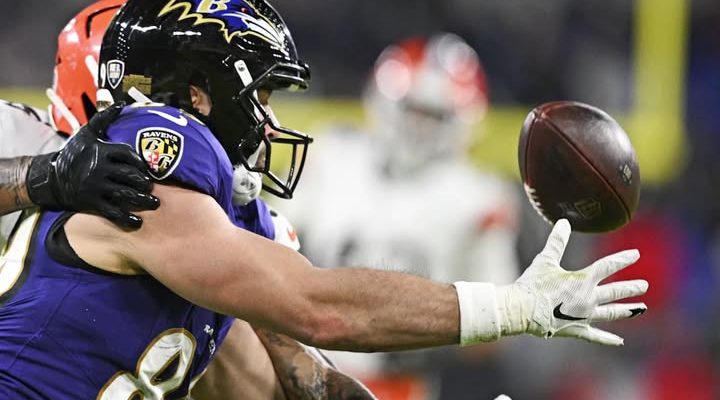Fantasy football is a game of strategy, research, and sometimes, gut instinct. Every season, managers scour depth charts, analyze matchups, and listen to expert advice to build the best possible roster. One piece of advice circulating this year is a warning to avoid a certain Baltimore Ravens tight end. While the Ravens have historically been a team that utilizes tight ends effectively, experts are cautioning fantasy managers to steer clear of this particular player. Here’s why.
The Baltimore Ravens have long been known for their tight-end-friendly offense. From Todd Heap to Dennis Pitta to Mark Andrews, the franchise has a rich history of featuring tight ends as key components of their passing game. This tradition has led many fantasy managers to automatically assume that any starting tight end for the Ravens is worth rostering. However, this season, that assumption could be a costly mistake.
The player in question is Isaiah Likely. While Likely has shown flashes of potential, there are several reasons why fantasy experts are advising managers to look elsewhere. The first and most obvious reason is the presence of Mark Andrews. Andrews is one of the best tight ends in the NFL and has been Lamar Jackson’s favorite target for years. When healthy, Andrews commands a significant share of targets, leaving little room for another tight end to thrive in the offense. Even if Andrews were to miss time, the Ravens’ offense is not the same high-volume passing attack it once was, which limits the upside of any secondary tight end.
Another factor working against Likely is the Ravens’ offensive philosophy. Under offensive coordinator Todd Monken, the team has shifted toward a more balanced approach, incorporating a heavier rushing attack and spreading the ball around in the passing game. This means fewer concentrated targets for any one player outside of the primary options like Andrews, Zay Flowers, or the running backs. Likely may see the field, but his opportunities will likely be sporadic and inconsistent—a death knell for fantasy relevance at the tight end position.
Consistency is key in fantasy football, and tight end is already one of the most volatile positions. Outside of the elite options like Travis Kelce or Sam LaPorta, most tight ends are touchdown-dependent for fantasy success. Likely falls into this category, but with Andrews dominating red-zone looks, his chances of finding the end zone regularly are slim. Even in games where the Ravens score multiple touchdowns, Likely is far from a lock to be involved.
Durability is another concern. While Likely has not had major injury issues in his young career, the tight end position is notoriously physical, and players often miss time due to bumps and bruises. If Likely were to go down, the Ravens have other options they could turn to, further diluting his potential value. Fantasy managers don’t want to invest in a player who could lose his role at any moment due to injury or scheme adjustments.
The depth of the tight end position this year also plays a role in the experts’ advice. While there may not be many elite options, there are plenty of mid-tier tight ends who offer more reliable floors than Likely. Players like Jake Ferguson, Dalton Schultz, or even rookie Brock Bowers may be available in later rounds and present safer, higher-upside options. Fantasy managers are better off taking a shot on a tight end with a clearer path to targets rather than hoping Likely carves out a meaningful role in a crowded offense.
Some may argue that Likely’s talent alone makes him worth a flier in deeper leagues. After all, he had a few standout performances when Andrews was injured in 2023. However, those games were the exception, not the rule. Fantasy football is about predicting future production, not chasing past outliers. Unless Andrews suffers a long-term injury, Likely’s ceiling is capped, and his floor is dangerously low.
Finally, there’s the opportunity cost. Every roster spot matters in fantasy football, and drafting or holding onto Likely means passing on another player who could provide more value. Whether it’s a high-upside handcuff running back, a breakout wide receiver, or even a streaming defense, there are almost always better uses for a bench spot than a backup tight end with limited weekly upside.
In conclusion, while Isaiah Likely is a talented player in real-life football, fantasy managers should heed the experts’ warnings and avoid him in drafts. Between Mark Andrews’ dominance, the Ravens’ run-heavy offense, and the general volatility of the tight end position, there are too many factors working against Likely to trust him as a reliable fantasy option. Instead, managers should target tight ends with clearer roles or explore other positions where value can be found later in drafts. Fantasy football is all about maximizing opportunities, and Likely simply doesn’t offer enough to warrant a roster spot in most leagues.
The best fantasy managers know when to resist the hype and make logical, data-driven decisions. This year, that means steering clear of the Baltimore Ravens’ secondary tight end and focusing on players with better paths to production. Your fantasy team will thank you later.



